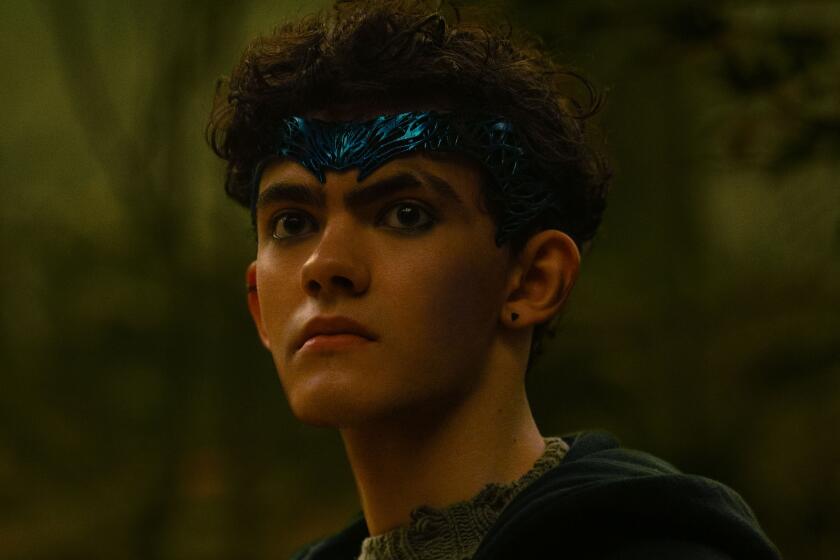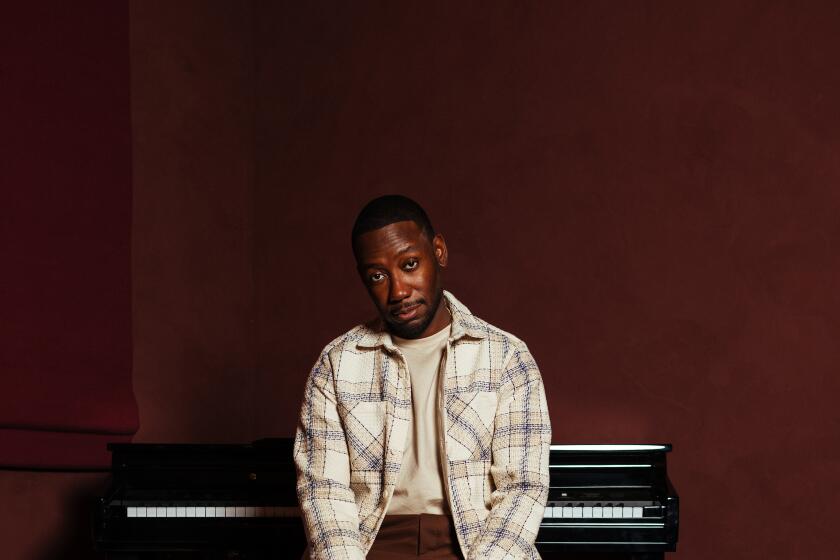Where Drugs and Poverty Intersect
It’s rough getting into the head and behind the large, hollow eyes of the man with the dirty baseball cap and the sweat-soiled undershirt. Gary McCullough won’t stay still for the camera. He is a junkie in a hurry. There are drugs to score.
When he finally slows down at the forbidding intersection where Fayette and Monroe streets meet in West Baltimore to face the camera for an interview, McCullough’s desperation momentarily dissolves into something far more accessible, and approachable. He talks easily about life before addiction as a successful business and family man, a life long gone and destroyed but not forgotten.
But as the questions about his addiction and what went wrong in his life become too pointed, McCullough darts away, armed only with his all-consuming appetite for his next fix, a hit that will get him through another dismal day on the corner.
As presented in HBO’s new miniseries “The Corner,” the exchange plays like a cinema verite dance in a documentary about the self-destructive life of a junkie. But the scene is actually a fictional dialogue that kicks off the opening to the innovative and fact-based miniseries that chronicles the true story of an open-air drug market in a poor African American neighborhood. McCullough, who lived on the streets, is portrayed by actor T.K. Carter, while the unseen interviewer is actor Charles S. Dutton, who directed the miniseries.
The six-hour project, which begins next Sunday, represents an unusually high creative risk for the pay network, which has found success with projects such as “The Sopranos” and “Sex and the City.” Presented in one-hour installments, the miniseries boasts no big stars and vividly depicts the bleak and harrowing existence of a decaying neighborhood and its drug-ruined inhabitants--heroin and cocaine “fiends” operating with their flexible code of honor and dishonor.
Yet, under Dutton’s hand, “The Corner” becomes a search for the humanity inside the addict--a painful journey he knows only too well.
“My only brother died in 1993 of AIDS. He was a heroin junkie. My sister is a recovering addict,” Dutton said. “There were times when I despised my family members for being junkies. They were beyond help. I have spent tens of thousands of dollars trying to help them, been put through every conceivable manipulation. They nearly killed my mother.
“There used to be a human being before that monster of addiction took over,” continued Dutton, a stage veteran best known for his TV turn in the series “Roc.” “I’m still looking for the person who used to be my sister. She was a beautiful woman before the drug took over. No matter how deep the addiction is, there is a person trying to rediscover their humanity.”
*
Based on the nonfiction book “The Corner: A Year in the Life of an Inner-City Neighborhood,” it was shot near where authors David Simon and Edward Burns conducted their examination of a world in which men, women and their families are held prisoners by their addictions. The “interview” scenes begin and end each episode.
The world of the corner is an uneasy one. In addition to sequences of unexpected and explosive violence, there are several explicit scenes depicting addicts injecting narcotics into their arms, knuckles, necks, rear ends, any body part that might contain a pulsing vein. Their bodies are ravaged by sores and needles. Their language is raw and coarse. There are few heroes or heroines, and many of the characters are unsympathetic--taking two steps back for every one forward--and the ending is not exactly upbeat.
Even the makers of “The Corner” are cautious about the audience appeal of the miniseries, which is HBO’s first since the award-winning 1997 “From the Earth to the Moon.”
Said Simon, who is executive producer of the miniseries: “There’s a great deal of nervousness about this. I think it’s improbable that a project like this even made it onto American TV screens. There is a vulnerability. We all may be taking a big gulp.”
Added Chris Albrecht, president of original programming for HBO, “Yes, this is a big financial and creative risk for us. But this story is absolutely worth doing and deserves to be done. It’s a tale of redemption.”
In addition to Carter, a former co-star on “Punky Brewster,” the miniseries stars Khandi Alexander of “ER” and formerly of “NewsRadio,” who is virtually unrecognizable as Fran Boyd, the brash but burned-out former wife of McCullough whose addiction doesn’t keep her from wanting a better life for her children. Also featured is Sean Nelson as DeAndre McCullough, the troubled teen son of Gary and Fran, Tyra Ferrell as a dedicated recreation center director and Glenn Plummer as an addict who uses art to escape the corner.
“The Corner” is likely to provoke controversy among African Americans with its downbeat themes and less-than-admirable characters, arguably one of the most in-depth and exhaustive examinations of African American life to be found on television.
But HBO executives and the makers of “The Corner” say the pitfalls are more than offset by the humanity and universality of the story and its characters. They maintain “The Corner” is more than a tale of a black community in disrepair, transcending race and class. Its depiction of lost and found humanity should be enticing to viewers, they say.
David Mills, a veteran writer of “NYPD Blue” and “ER” and an executive producer of “The Corner,” said, “As far as controversy, I’m not worried about anyone who actually watches it. A white racist could look at this for six hours and still feel sorry for the struggles of the people. Every human being is weaker than he or she wants to be. This is about some of those people. It is much bigger than race.”
Mills, who wrote the project along with Simon, added, “Just because these people live in a world invisible to us doesn’t mean their stories aren’t worth telling.”
*
Mills and the other filmmakers gave much of the credit for humanizing the inhabitants of the corner to Simon, who spent a year living among them. Simon also wrote “Homicide: A Year on the Killing Streets,” which sparked the critically acclaimed NBC series “Homicide: Life on the Street.”
During the course of the six hours, McCullough and his family are shown in flashback as being on the brink of reaching the American Dream. But he becomes caught up in Fran’s descent into drugs, and the whole family becomes victimized by addiction.
In showing the destructive force of narcotics, Dutton wanted to bring a disturbing authenticity to the injection scenes. “We needed to be as graphic as possible, while staying emotionally accessible to the audience,” he said. “The most important part of the movie is a scene in the ‘shooting gallery’ of this drug house, where this woman is putting a needle in this guy’s ass and another guy’s neck. That is the way it really is. They have no more veins left. They’ve burned them all out.”
Other scenes are almost as bleak. Family members and neighbors lie and steal from one another without so much as a blink. A teenager dealing drugs grabs his mother’s neck, wanting to snap it after she tries to discipline him. A hospitalized junkie welcomes a fresh injection of drugs into his tubes from friends, even though doctors have warned him that he will die if he doesn’t stop using narcotics. Much of the miniseries is shot with hand-held Steadicams. Other than the periodic rap tune blaring from radios, there is no music on the soundtrack to soften the impact.
Despite their obvious enthusiasm for the project, Albrecht and Dutton acknowledge that “The Corner” is a hard sell to viewers. Even they almost passed on it.
When Albrecht first started reading the script on a plane several months ago, he initially found the story too dark and depressing. He put the script down and started reading another project, but found he couldn’t focus. He kept thinking back to “The Corner” script, wondering about the fate of the characters. He picked it up again and found himself hooked. “I thought, ‘This is very, very good and cries out to be made.’ ”
Dutton, whose only previous directing experience was HBO’s “First Time Felon,” about a gang member who gets into trouble, also felt a resistance when first approached about directing the project.
“I just wasn’t interested,” said Dutton. “I had already directed my ‘urban movie,’ and I thought it would be just another one of those typical ‘in the ‘hood’ stories that have already been told a thousand times. I still had negative feelings even after I started reading.”
But he soon changed his mind: “This was an opportunity to present a different perspective and viewpoint of inner-city life, to tell the story from the viewpoint of the addict rather than the dealer. I know junkies who have extraordinarily high IQs. They’ve just been taken over by the disease.”
To reach his goal, Dutton said he was firm with his cast in rehearsals before shooting: “I demanded, ‘I don’t want anyone here to play a junkie. Don’t give me any mannerisms. Just play human beings.’ People had started showing how they would play a 1970s junkie, and I said that would be good if we were dealing with that era. But we’re dealing with 1990s heroin, where 3% to 4% is the real stuff and the rest is chemical. I said, ‘Just play human.’ I also told them to get in touch with the real people. I said, ‘Take them out to dinner. And don’t believe a word they say.’ ”
*
For viewers to connect with the characters, it was also important for Dutton and his producers to secure a cast that would be largely unknown: “We insisted that we not go for ‘names.’ We needed that suspension of disbelief that we couldn’t get with big names.”
Carter, who plays McCullough, clicked immediately into Dutton’s vision. The actor, who has been mostly relegated to supporting roles in comedies throughout his career, has had his own problems with narcotics. In the early 1990s, Carter was arrested at least twice in drug-related incidents.
“I just totally felt for Gary,” said Carter. “I’ve had drug problems and cocaine addiction. I lost my father to a drug-related death. I’ve lost a lot of friends. I was fortunate to come out on the other side and get my life together. But I haven’t forgotten. I kept Gary with me all the time. I slept Gary, I breathed Gary.”
Alexander, who plays Fran Boyd, hung out a bit with her real-life counterpart during filming. “She was just a wealth of information. I could just look at her and drink in the reality of her life. She and I are friends now. I love her.”
The real Boyd appears at the conclusion of the miniseries as a survivor, along with other former residents of “The Corner.” They talk about how the intersection affected them, and how they have hopefully turned their lives around.
“If we don’t show the humanity and survival of these people, then we’re just looking at a train wreck,” said Simon. “And what’s the point of that?”
The complete guide to home viewing
Get Screen Gab for everything about the TV shows and streaming movies everyone’s talking about.
You may occasionally receive promotional content from the Los Angeles Times.




